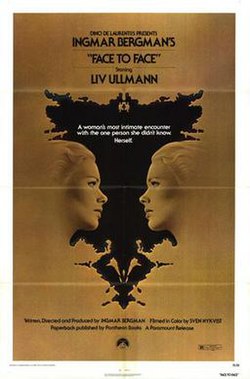Plot
Dr. Jenny Isaksson (Liv Ullmann) is a psychiatrist who has taken a temporary job as the medical supervisor at a mental hospital while her husband is in America and their daughter Anna is away at camp. As she and her family are in the process of selling their home, she temporarily moves in with her grandparents (Gunnar Björnstrand, Aino Taube), who cared for her after her parents died when she was a child. The experience of moving back into her old bedroom proves disturbing for her and conjures up feelings of anxiety, resulting in her first beginning to have dreams and then waking visions of a one-eyed old woman. Jenny's personal problems are compounded by Mari, a particularly disturbed patient at the mental hospital, who is prone to fits of violence and who tells Jenny that she is incapable of treating her because she cannot experience love.
At a party hosted by the ex-wife of one of her colleagues at the mental hospital, Jenny meets the divorced Tomas (Erland Josephson), a medical doctor. After he flirts with her, she agrees to go home with him, where she rejects the idea of having sex with him before he brings it up. Nonplussed, Tomas calls her a taxi and they agree to meet again sometime in the future for a potential sexual encounter.
Going to her old home one day, Jenny discovers Mari, who has escaped from the mental institution; with her are two men who explain that Mari requested they take her to Jenny, whose address they found in the phone book. When Jenny attempts to call the police, the men attack her and attempt to rape her, but quickly stop when they have difficulty penetrating her. That night, Jenny accompanies Tomas to a concert and then returns home with him, telling him she wants a non-sexual encounter with him in which they will sleep in bed together without touching. In the middle of the night, Jenny tells him what happened and admits that she is so desperate to experience physical pleasure that she wanted the rapist to have sex with her, but that she could not become physically aroused. When Tomas attempts to comfort her, she suffers a breakdown and asks to be sent home in a cab, assuring him they'll see one another soon.
Jenny sleeps at her grandparents' for several days, missing work. When they leave town for the weekend she initially calls Tomas to go to the movies, but instead hangs up on him, records a suicide note on a tape recorder in which she tells her husband that she has never experienced emotional or physical pleasure, and then takes fifty Nembutols.
In a dream, she apologizes to herself for her suicide attempt, speaks to her grandmother, and tells herself that she fears old people like her grandparents. She encounters an imagined Tomas, who warns her not to open the door to her deep and forgotten memories, but she opens anyway. She sees the old woman, who caresses and comforts her. Jenny wakes up in the hospital. Tomas is there. He went to find her after she hung up on him and didn’t answer when he tried calling back.
They talk, and Tomas tries to comfort her by telling her about his strict upbringing, not being allowed to burp or fart at dinner. In a second dream, she ineptly tries to deal with a crowded room of patients. Her grandfather tells her that he’s afraid of dying, and Anna sees her and runs away.
When she wakes, her husband is there, but he tells her that he has to return to America. She tells him to tell her grandmother the truth about what happened and that she will talk to Anna.
In the next dream, she tries to find her parents, whom she last saw at their funeral when she was nine. She is distressed by guilt and shame. When she finds them they first leave her, but when they return to comfort her, she pushes them away.
Jenny wakes up and tells Tomas about her childhood. They share deep secrets. Tomas says that he was never divorced, instead he had lost a friend, a man he lived with for five years. The conversation deteriorates and Jenny becomes hysterical. In a last dream, she attends her funeral, awaking during the cremation.
A nurse tells Jenny that Anna wants to meet her. She tries to tell Anna what she did and why, but it doesn’t go well. Anna tells Jenny that she knew that she never liked her, and she leaves. Tomas then tells her that he’s going to Jamaica for an amoral vacation and may not return.
Jenny returns to her grandmother who believes that Jenny has only been fatigued. She is distressed by her husband’s impending death. Jenny offers her some comfort and then calls the mental hospital to tell them that she’ll be in to work in the morning.
